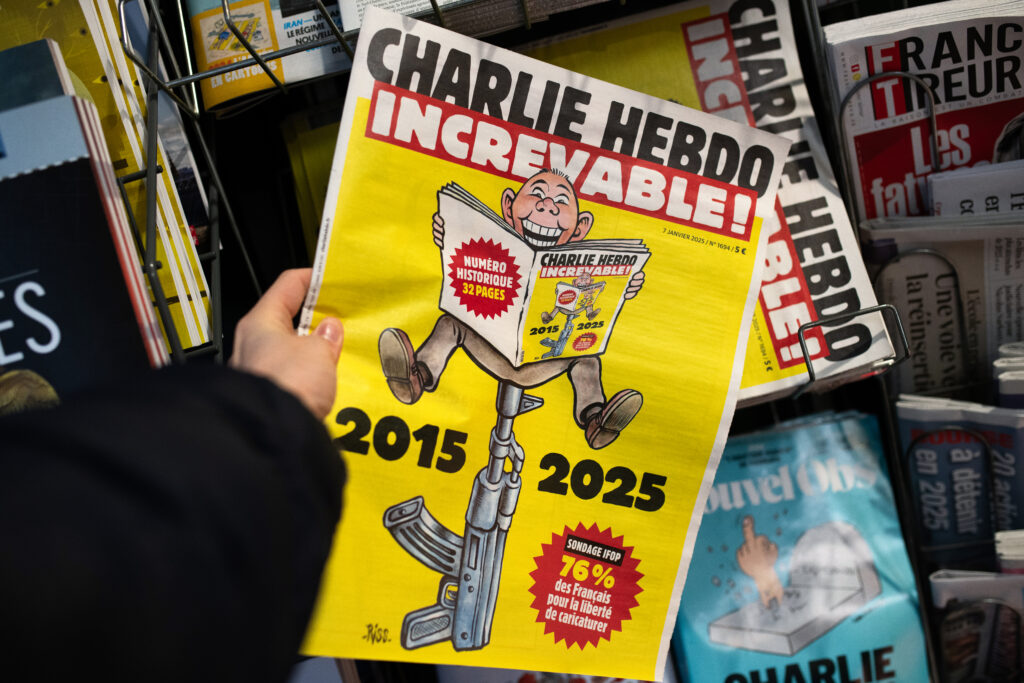French satirical newspaper Charlie Hebdo unveiled a special edition featuring a God-themed cartoon contest on Monday to mark 10 years since a deadly attack on its offices by Islamist gunmen. The front-page shows a cartoon celebrating the atheist paper’s existence with the caption “Indestructible!” while four inside pages contain the results of the caricature competition to mock God and religious leaders.”Satire has a virtue that has enabled us to get through these tragic years: optimism,” said an editorial from director Riss, who survived the January 7, 2015, massacre that left 12 people dead, including eight editorial staff. “If you want to laugh, it means you want to live. Laughing, irony, and caricatures are manifestations of optimism. Whatever happens, dramatic or happy, the desire to laugh will never cease.” The 2015 attack by two Paris-born brothers of Algerian descent was said to be revenge for the weekly’s decision to publish caricatures lampooning the Prophet Mohammed, Islam’s most revered figure.The massacre of some of France’s most famous cartoonists signalled the start of a gruesome series of Al-Qaeda and Islamic State plots that claimed hundreds of lives in France and western Europe over the following years.The edition unveiled to the media on Monday will go on sale widely on Tuesday when public commemorations by President Emmanuel Macron and Paris Mayor Anne Hidalgo are set to take place.Speaking to French ambassadors on Monday, Macron said that “terrorism is a risk that remains significant in our society and that requires no let-up and collective vigilance”. – Cartoons -Charlie Hebdo’s editors had called on cartoonists to submit their “funniest and meanest” depictions of God in a typically provocative and defiant contest for the special anniversary edition.”Yes, we can laugh about God, especially if he exists,” said a headline over what the paper said were the best 40 out of more than 350 entries.Along with some typically crude and sexually explicit images, one of them refers to the Prophet Mohammed with the caption “if I sketch someone who is drawing someone who is drawing someone who is drawing Mohammed, is that ok?”It shows a cartoonist drawing a picture of another cartoonist who is working on a picture of a cartoonist drawing a bearded figure who looks like Mohammed — whom many Muslims believe can never be depicted.Another cartoon appears to show the leaders of the three Abrahamic religions — Christianity, Judaism and Islam — as a three-headed dog. The paper now works from a secret location and its reconstituted editorial team lives under constant police protection due to ongoing threats.Elsewhere on Monday, a 29-year-old Pakistani man and five alleged accomplices are set to go on trial in Paris over a machete attack at the paper’s old offices in 2020. – Survey results – This week’s edition also features a survey of attitudes in France towards press freedom, caricatures and blasphemy, carried out by the Ifop survey group in association with the newspaper.It found that 76 percent of respondents believed freedom of expression and the freedom to caricature were fundamental rights, while 62 percent thought people had the right to mock religious beliefs.The Charlie Hebdo killings fuelled an outpouring of sympathy in France expressed in a wave of “Je Suis Charlie” (“I Am Charlie”) solidarity with its lost cartoonists Cabu, Charb, Honore, Tignous and Wolinski among others.But it also led to questioning and a furious backlash in some Muslim-majority countries against Charlie’s deliberately offensive, often crude humour which is part of a long-standing French tradition of caricaturing. Since its founding in 1970, it has regularly tested the boundaries of French hate-speech laws, which offer protection to minorities but allow for blasphemy and the mockery of religion.”There are limits, as there were limits before, on anti-Semitism, racism, incitement against people,” editor-in-chief Gerard Biard told AFP recently.”We’re a newspaper of ideas. We don’t target people and if we caricature people, it’s for what they represent, not what they are,” he added. Critics say the weekly sometimes crosses the line into Islamophobia, pointing to some of the Prophet Mohammed caricatures published in the past that appeared to associate Islam with terrorism.A front-page depiction of the Virgin Mary in August suffering from the mpox virus led to two legal complaints from Catholic organisations in France. adp-kp-may-reb/phz
Mon, 06 Jan 2025 11:49:10 GMT
